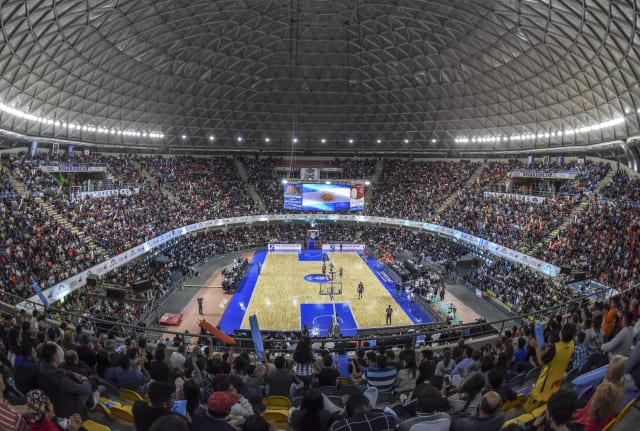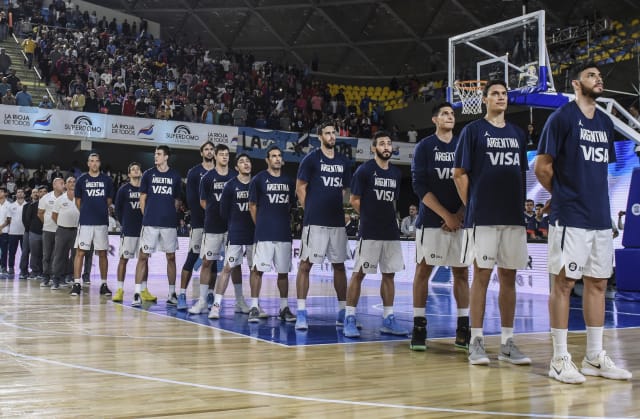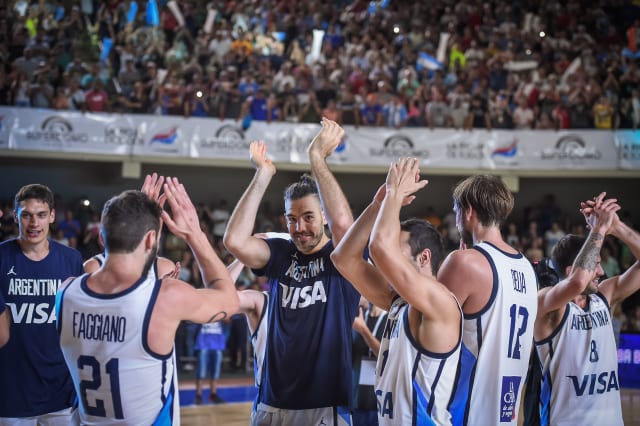Sergio Hernandez: ''Our team has always displayed the same identity. That's as valuable as qualifying''
LA RIOJA - Nine victories, just one defeat, and 19 points took the Argentine national team to reach their goal: qualifying to the FIBA Basketball World Cup in China.
LA RIOJA (FIBA Basketball World Cup Americas Qualifiers 2019) - Nine victories, just one defeat, and 19 points took the Argentine national team to reach their goal: qualifying to the FIBA Basketball World Cup in China.
On Thursday, November 23, 2017, playing as locals at La Rioja’s Superdomo, Argentina got their first points in the Americas Qualifiers by defeating Paraguay 96-63 with 22 points and 11 rebounds by their captain, Luis Scola. It was also on a Thursday, on the same month, but on the 29th day, and on 2018, when they set foot at the World Cup in that same stage and against one of the most powerful teams in the continent and current twice-champions of the World — the United States.

“The venue was important. The adequate stages were chosen, and we could see the results of that. We worked well in each venue, according to what each game could generate,” said the president of the Argentine Basketball Confederation, Federico Susbielles. This Thursday’s victory (80-63) was their tenth against the North American squad; a record that no other country in the world has been able to attain: three in World Cups, one in the Olympic Games, three in the Pan American Games, two in Americas Tournaments and the last one, in the Qualifiers.
After their triumph against Mexico, 85-71, and with 22 points once again by their center, the Argentines were able to seal their qualification and celebrate what will be their 14th appearance, since 1950, when they were crowned as the first-ever world champions.
The goal was achieved. The team coached by Sergio Hernández crowned with those two triumphs — and two dates away from the tournament's final — the task that begun more than a year ago at the AmeriCup. The coach did a great job with a national team that is currently in the middle of a generational rebuilding process after the achievements made by the Golden Generation, and with a fundamental element like Luis Scola. The essence is the same as that of the team that won the silver at Indianapolis 2002, the gold at the 2004 Olympic Games in Athens and the bronze at the 2008 Games in Beijing.
Susbielles says that the Qualifiers “in a sports sense left an insurmountable experience. It was a work process that started at the AmeriCup and whose game proposal was respected throughout time, even with the players that debuted in La Rioja, like Lucas Faggiano.” Argentina are currently second in the tournaments general standings for points per game, with 70.2, behind Canada, as well as in field goals (48.0) and in two-pointers (57.2). They’re first in steals (101) next to the Dominican Republic, third in assists, with 203, fourth in long-distance shots (35.2), and with Scola as lead scorer with 57.5% of the tournament's points, and with 16.7 points and 8.1 rebounds per game, also making him the leader of his national team.
With Scola leading, Facundo Campazzo, Gabriel Deck, Luca Vildoza, Patricio Garino, Nicolás Laprovittola, Nicolás Brussino, Marcos Delía, Patricio Garino, Lucio Redivo, además de Máximo Fjellerup, Javier Saíz, Eric Flor, Franco Giorgetti, Leo Mainoldi, Roberto Acuña, Marcos Mata, Nicolás Aguirre, Franco Balbi, Federico Aguerre, Juan Pablo Vaulet, Matías Sandes, Lautaro Berra and Luciano González; and even veteran Paolo Quinteros, who was recently called for the stage at La Rioja, contributed their part in this qualification to the FIBA Basketball World Cup. They had the same opportunity of belonging to this national team and continue the route with that same drive to face each game no matter the rival. This is the legacy left by the Golden Generation.

Coach Sergio Hernández, who led the team for these two periods, from 2005 to 2010, and from 2015 until today, agreed with Luis Scola about the similarities of the current group of players and the ones that made history starting in 2001 and became the Golden Generation.
“Luis has been saying this to me for quite some time now, since the middle of the windows. He's been in both processes. I remember that in 2002 the National Team was surprising us in every game,” he pointed out and added: “Qualifying to a World Cup isn’t something you do every day. The team lived great moments even as we included players that didn’t have previous experiences in the windows.”

“We're very lucky to have a captain like Luis. It's one of the keys as to why this generation has the professional attitude for which they are acknowledged. He taught them all the differences between high competition and high performance,” said the coach, who also analyzed the qualification from his perspective: “I wasn't very aware of the importance of the triumphs in previous windows. The value of that win against Panama, as visitors, when Scola didn’t play, or the victory in Mexico. As well as the meaning of losing against Uruguay in Olavarría. If we didn't qualify to this World Cup, until 2023 we wouldn’t have returned to play in any important tournaments.”
In 2019, for the first time in history, the competition will have 32 teams and one of them will be Argentina.
On his Twitter feed, Hernández shared an interesting analysis: “... our national team, for different reasons, formed different squads at the last minute and always displayed the same face. The same identity, the same drive, the same mystique. This is as valuable as the qualification itself.”
There are two games left before getting to China; first, against Puerto Rico and then, against the United States. They’ll play both games as visitors, and this team can only think about winning them and add the greatest number of points possible to end first in Group E and start preparing for their World Cup commitment.
“We have to compete against a lot of teams that are better than the ones that we've been facing, but we won with force and that leaves us at ease. We must keep working with the same intensity. If I crossed the world to come to La Rioja, I think I can stay in China,” assured captain Luis Scola.
FIBA